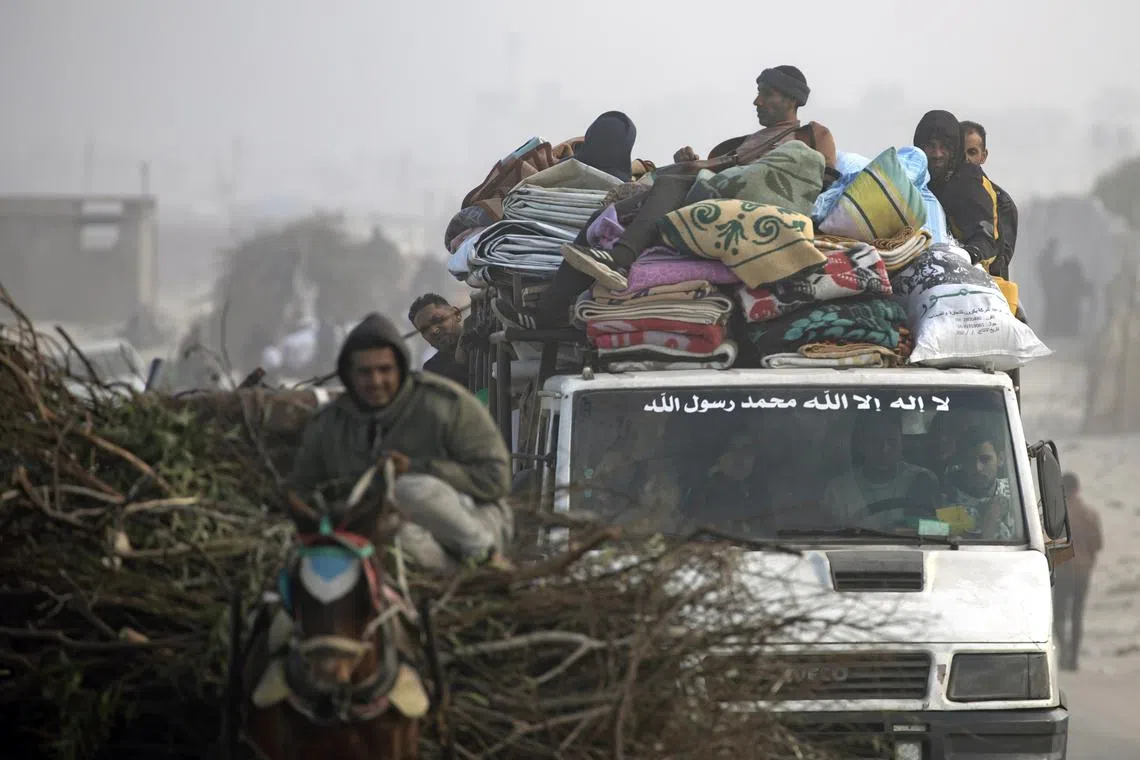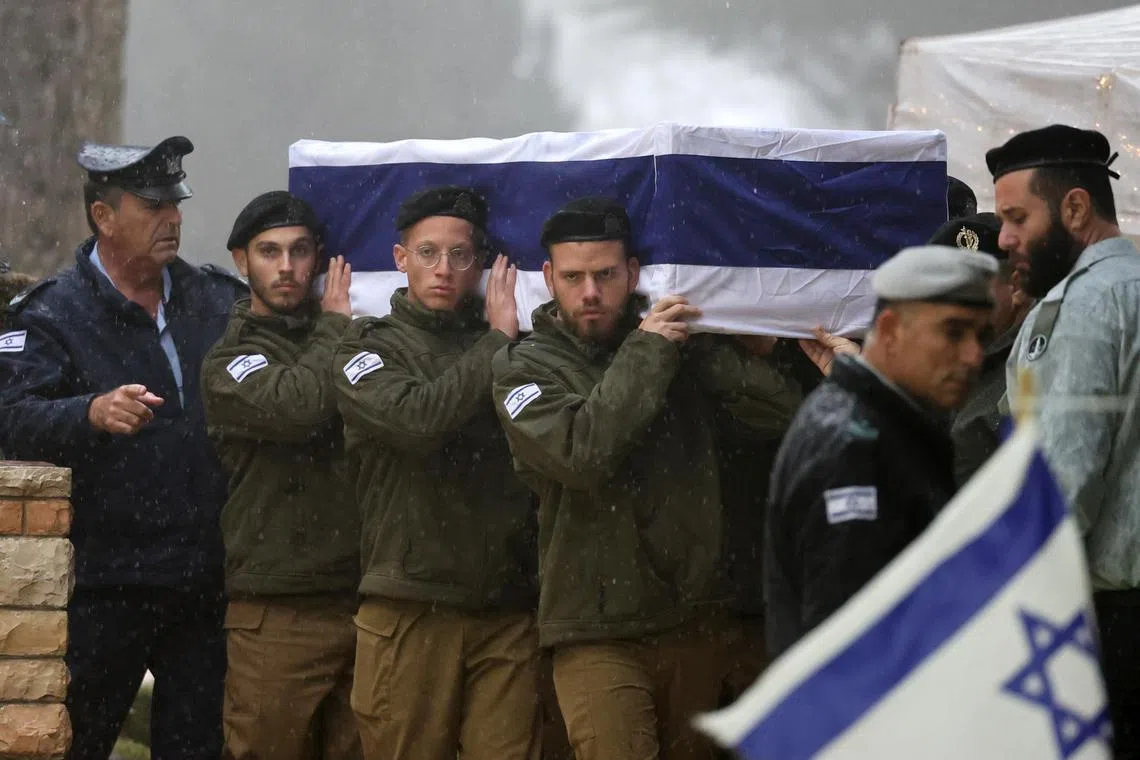US pushes for pause in Gaza, as Israel suffers worst loss of soldiers
Sign up now: Get ST's newsletters delivered to your inbox

Displaced Palestinians walk along the coastal road, after the Israeli army told Khan Younis camp residents to leave and go to the camp at Rafah, near the Egyptian border.
PHOTO: EPA-EFE
GAZA/JERUSALEM/WASHINGTON – The White House said on Jan 23 its envoy was having active discussions about ensuring the release of hostages in Gaza and securing a humanitarian pause in the war after Israel suffered its worst loss of soldiers in over three months of conflict.
In the hours after the death toll of 24 from two separate incidents became clear, officials in Israel reiterated that the objectives of its war against the Palestinian Hamas movement that runs Gaza were unchanged and that efforts were being made to bring about release of more than 100 hostages.
Acknowledging that Jan 22 had been one of the most difficult days since the war broke out, Prime Minister Benjamin Netanyahu said: “In the name of our heroes, for the sake of our lives, we will not stop fighting until absolute victory.”
Israeli government spokesman Eylon Levy said there would be no ceasefire that left Hamas in power and hostages in Gaza, following the militant group’s cross-border rampage
Palestinian health officials said at least 195 Palestinians had been killed in the past 24 hours, raising the documented death toll from Israeli air strikes and shelling to 25,490. Thousands more are feared lost in the rubble.
The soldiers’ deaths came on the day the Israeli military launched its biggest operation
Israeli forces have killed more than 100 militants in western Khan Younis in the past 24 hours, military spokesman Rear Admiral Daniel Hagari said on Jan 23 evening.
Israel says it has killed around 9,000 militants in total. Reuters is unable to verify the number.
US envoy in Cairo
However, giving weight to media reports that a deal could be in the works to pause the fighting at least temporarily and free hostages, Qatar’s Foreign Ministry had said earlier in the day it was engaging in serious discussions with both sides.
“We have presented ideas to both sides, we are getting a constant stream of replies from both sides, and that in its own right is a cause for optimism,” Foreign Ministry spokesperson Majed Al-Ansari said.
White House spokesman John Kirby said later that US Middle East envoy Brett McGurk was in Cairo and would travel in the region for “active” discussions on ensuring the release of hostages and securing a humanitarian pause.
“The conversations are very sober and serious about trying to get another hostage deal in place,” Mr Kirby told reporters.

Displaced Palestinians head south, after the Israeli army told residents of Khan Younis camp to leave and go to the Rafah camp near the Egyptian border.
PHOTO: EPA-EFE
Each of the warring sides blamed the other for causing the collapse of a seven-day truce in November by rejecting terms to extend the daily release of hostages held by militants in exchange for Palestinian detainees.
Women, children and foreign hostages were freed, but mediators failed at the final hour to find a formula to release more, including Israeli soldiers and civilian men.
On Jan 23, former hostage Aviva Siegel, 62, who was taken captive from Kfar Aza kibbutz with her husband who is still held in Gaza, spoke at the Knesset, Israel’s Parliament, during a discussion about sexual abuse during the war.
“I can’t live with it. I can’t breathe. I can’t cope with it. It’s too difficult. It’s been almost four months and they are still there... Something has to change. Urgently. Now,” said Ms Siegel, who was released during the November truce.
Tanks shut Khan Younis road
Giving details of the latest Israeli casualties, military spokesman Adm Hagari said 21 of the soldiers were killed when “a militant squad surprised the force with RPG (rocket-propelled grenade) fire” on Jan 22.
He said the first rocket hit a building in which explosives had been laid out to demolish it. This led to an explosion that caused the collapse of the building and the one next to it.
Three soldiers were killed in a separate attack. In total, 220 Israeli soldiers have been killed since the start of the ground offensive in late October.
Families and friends mourned at funerals across Israel, touching coffins draped in the national flag and hugging one another in their grief.

Israeli soldiers carry the coffin of IDF soldier Elkana Vizel, during his funeral at the Mount Herzl military cemetery in Jerusalem.
PHOTO: EPA-EFE
Advancing Israeli tanks shut the road out of Khan Younis
“I am trying to leave for Rafah, but the tanks are now very near to the coast and are firing towards the west,” Mr Shaban, 45, an electrical engineer with four children, said by phone.
The Israelis have blockaded hospitals, which Palestinian officials say makes it impossible to rescue the dead and wounded.
At the European Hospital, reached by Reuters in southern Khan Younis, Mr Ahed Masmah brought in five corpses, piled on a mattress on his donkey cart.
“I found them face down in the street,” he said.
At Khan Younis’ main Nasser hospital, the biggest still functioning in the Gaza Strip, bodies were being buried on the grounds because it was unsafe to go out to the cemetery.
Mr Ashraf Al-Qidra, spokesman for Gaza’s Health Ministry, said medical teams were unable to transfer critical cases from the Nasser Medical Complex to the nearby Jordanian field hospital due to ongoing shelling.
Israel says Hamas fighters operate in and around hospitals, which hospital staff and Hamas deny.
Mr Philippe Lazzarini, head of the United Nations Palestinian relief agency UNRWA, said six displaced people had been killed at one of the biggest UN-run shelters in Khan Younis.
The Israeli military said it was unaware of any strikes in that area at the time in question.
After nightfall, an Israeli air strike hit a house in Jabalia in the northern Gaza Strip, killing seven Palestinians, health officials said. REUTERS


